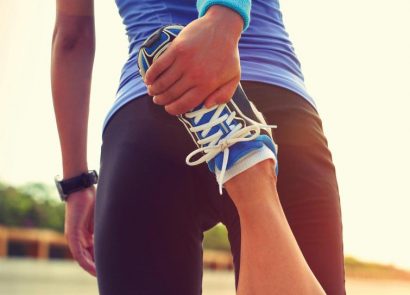You’ve been dreaming of your summer break all year, only to fall ill as soon as you land. Sound familiar? Or perhaps you suffer with travel sickness or anxiety and dread the journey to your destination. Getting sick when we’re not at work is very common – so common in fact, that scientists have dubbed it ‘leisure sickness’. So, what can you do to stay well when you’re away? We asked the experts for their top tips for a healthy holiday so you can enjoy your getaway without the stress – you’ve earned it!
Get vaccinated if necessary
If you’re travelling to a country where you might need to be vaccinated against certain diseases, be sure to check with your doctor well in advance. “Seek advice from your GP at least eight weeks prior to your trip to ensure you know what you need, what the risks are at your holiday destination, and so that you can make an appointment in advance and the vaccinations have time to work,” advises Dr Riccardo Di Cuffa, GP at Your Doctor (your-doctor.co.uk). “For general travel information, visit fitfortravel.nhs.uk.”
Check your stress
Feeling anxious about a trip is common, but it can add to symptoms such as an upset stomach. “Stress is a major factor for gut health, so I suggest you start relaxing before getting away by taking a visual holiday,” says nutritional therapist Julie Silver (juliesilver.co.uk). “Gently close your eyes and imagine smelling the sea air, seeing the bright blue sky, tasting the saltiness of the sea on your lips, feeling the warm gentle breeze on your face. Your mind doesn’t know whether something is imagined or real so, just by focusing on an idyllic holiday scene and getting your senses involved, your body will react as if you were there and de-stress instantly.”
Prepare for travel sickness
Feeling ill is no fun, but luckily there are ways to avoid it. “If you get travel sick, you can use remedies or teas that contain ginger, as this will soothe and calm your stomach and will also help to reduce nausea,” says Rick Hay, nutritional director at Healthista (healthista.com). “Some people like to add honey as well. You could also try mint teas, including peppermint or spearmint. If you’re a nervous flyer, consider taking magnesium and B vitamins to help keep you calm (these should be taken with food, though). Herbal remedies, including lemon balm, ashwaganda, passionflower and lavender may also help to calm your nerves.”
Avoid jet lag
Sadly there’s no universal trick to beating jet lag, so try a few things and see what works for you. “Certain foods are known to be better for you than others when it comes to avoiding jet lag,” Dr Riccardo tells us. “If you’re looking to sleep on a flight in order to adjust to the new time zone, some people recommend eating carb-dense foods as you produce more of the sleep-inducing neurotransmitter serotonin. Proteins, on the other hand, are more likely to increase your sense of alertness and therefore encourage your body to stay awake so eat more proteins if you are trying to stay up upon arrival. Additionally, avoid alcohol and caffeinated drinks. Although you might find a G&T helps you drift off and a coffee helps to keep you up, their effects are generally short-term and can further mess up your internal clock. The air inside aeroplanes is also dry, which can bring on migraines and dry out your skin so replace wine with water to keep your body well hydrated.”
Prevent DVT
“Deep vein thrombosis (DVT) can be a risk if you are flying, particularly if it’s a long haul flight,” says Dr Riccardo. “Regularly walk around and stretch your legs on long journeys, drink water and preferably avoid alcohol. Wear loose comfortable clothing and anti-DVT special socks. If you have a family history of thrombosis or have had DVT previously, consult your doctor before travel.”
Take precautions
Diarrhoea is unfortunately one of the most common symptoms experienced during travel, according to the NHS, but it can be prevented. “In areas where it is difficult to maintain good hygiene and sanitation, take precautions with food to ensure it’s uncontaminated and cooked thoroughly and that all water has been purified,” says Dr Riccardo. “Use sanitising gel or hand wipes and ensure that your dishes, cups and utensils are clean. Where possible, choose food that is freshly cooked to a high temperature and served immediately while still hot. Be especially cautious with street vendors selling cheese, ice cream, fish and shellfish, salads, fresh herbs and fruit (including in drinks). Boiled and bottled water (with intact seal) is usually safe, as are hot tea and coffee, beer and wine. Don’t use ice in drinks unless in an established hotel chain.”
Look after your skin
You can very easily get sunburned when you’re in the pool without feeling it as much. “Make sure that your skin is well protected from the sun using a good, high SPF sunscreen,” says Dr Ross Perry, medical director of CosmedicsUK (cosmedics.co.uk). “Even ‘all day’ or ‘water resistant’ formulations should be reapplied after swimming. Reapplying sunscreen regularly will also help to stop your skin from drying out due to the moisturising benefits. If you can, shower off after swimming. When you’ve finished for the day, have a good shower back in your room to remove any traces of sunscreen and chlorine, then use a good moisturiser all over your body. After-sun products can be especially soothing, but any moisturiser or ‘butter’ designed for use on the body will help to revive dried out skin.”
Watch out for insects
“Insect bites or stings happen all the time and, while they may be painful or itchy, the symptoms will normally go away in a few hours or a couple of days,” says Dr Riccardo. “You may have a mild allergic reaction if it becomes red or swollen, but occasionally some people have a severe reaction which can include breathing difficulties, a fever, an obvious infection, dizziness or a swollen face or throat. Seek medical help as soon as possible if this happens.”






















